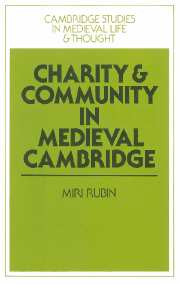Book contents
- Frontmatter
- Contents
- List of tables
- Acknowledgements
- List of abbreviations
- Map
- 1 INTRODUCTION
- 2 THE ECONOMIC BACKGROUND: SUPPLY AND DEMAND FOR CHARITY
- 3 THE IDEA OF CHARITY BETWEEN THE TWELFTH AND FIFTEENTH CENTURIES
- 4 THE CHARITABLE HOUSES OF MEDIEVAL CAMBRIDGE AND ITS SURROUNDINGS
- 5 LIFE IN A MEDIEVAL HOSPITAL: THE HOSPITAL OF ST JOHN, CAMBRIDGE
- 6 THE RELIGIOUS AND ECONOMIC FUNCTIONS OF THE HOSPITAL OF ST JOHN
- 7 CORPORATE AND INDIVIDUAL ACTS OF CHARITY
- 8 EPILOGUE
- Appendix 1 The rule of the hospital of St John the Evangelist, Cambridge
- Appendix 2 The list of masters of the hospital of St John the Evangelist, Cambridge (c. 1207–1507)
- Bibliography
- Index
7 - CORPORATE AND INDIVIDUAL ACTS OF CHARITY
Published online by Cambridge University Press: 28 October 2009
- Frontmatter
- Contents
- List of tables
- Acknowledgements
- List of abbreviations
- Map
- 1 INTRODUCTION
- 2 THE ECONOMIC BACKGROUND: SUPPLY AND DEMAND FOR CHARITY
- 3 THE IDEA OF CHARITY BETWEEN THE TWELFTH AND FIFTEENTH CENTURIES
- 4 THE CHARITABLE HOUSES OF MEDIEVAL CAMBRIDGE AND ITS SURROUNDINGS
- 5 LIFE IN A MEDIEVAL HOSPITAL: THE HOSPITAL OF ST JOHN, CAMBRIDGE
- 6 THE RELIGIOUS AND ECONOMIC FUNCTIONS OF THE HOSPITAL OF ST JOHN
- 7 CORPORATE AND INDIVIDUAL ACTS OF CHARITY
- 8 EPILOGUE
- Appendix 1 The rule of the hospital of St John the Evangelist, Cambridge
- Appendix 2 The list of masters of the hospital of St John the Evangelist, Cambridge (c. 1207–1507)
- Bibliography
- Index
Summary
Charitable activity was far more widespread than might be indicated by the study of institutions specifically intended for relief. It was carried out by individuals and by a variety of corporate bodies whose primary function was not relief, but which nonetheless had reason to include it in their activities. The scope of distributions is as difficult to assess as it was broad; one can only identify the types of occasions on which help would have been dealt to the needy, without attempting an exact computation of the frequency and scope of such occurrences.
The occasions were determined by several religious, economic and social prescriptions. Parish priests were supposed to use at least a quarter of their income for the relief of poor parishioners. Fraternities offered help to their members and offerings on occasions of intercession for dead brethren. Religious houses, including hospitals, were guided towards works of mercy by their rules and statutes, but also as part of their obligation to distribute alms at obits and on feast days. To these should be added a multifarious charitable network comprising individual acts of relief encouraged by preachers and parish priests. At funerals, when anxieties connected with the after-life were most acute, great largesse was manifested. Such relief, like doorstep charity as well as neighbourly and family support, was ubiquitous yet remains very difficult to assess.
DISTRIBUTION IN PARISHES
Charity was connected to parish organisation in two ways: the parish was the framework in which believers executed their religious obligations; it was also the unit in which tithes were collected and oblations received – revenues which were seen, from the earliest times of Christian organisation, as wholly or partially owed to the poor.
- Type
- Chapter
- Information
- Charity and Community in Medieval Cambridge , pp. 237 - 288Publisher: Cambridge University PressPrint publication year: 1987
- 1
- Cited by



